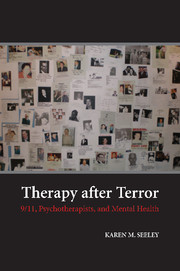Book contents
- Frontmatter
- Contents
- Acknowledgments
- Introduction
- 1 Trauma Histories
- 2 Volunteers for America
- 3 “Get Me Counselors!”
- 4 The Psychological Treatment of Trauma
- 5 The Trauma of Psychological Treatment
- 6 Diagnosing Posttraumatic Stress Disorder
- 7 Trauma as Metaphor
- 8 Mental Health in Traumatic Times
- Notes
- Works Cited
- Index
Introduction
Published online by Cambridge University Press: 05 August 2012
- Frontmatter
- Contents
- Acknowledgments
- Introduction
- 1 Trauma Histories
- 2 Volunteers for America
- 3 “Get Me Counselors!”
- 4 The Psychological Treatment of Trauma
- 5 The Trauma of Psychological Treatment
- 6 Diagnosing Posttraumatic Stress Disorder
- 7 Trauma as Metaphor
- 8 Mental Health in Traumatic Times
- Notes
- Works Cited
- Index
Summary
Like phantom limbs that still can be felt even though they no longer exist, the twin towers of the World Trade Center continue to haunt New Yorkers, who – in the words of cartoonist Art Spiegelman (2004) – now live “in the shadow of no towers.” During the first years of their absence, accounts of the attack – including journalistic, governmental, academic, fictionalized, and cinematic portrayals – proliferated. The multiplication of accounts is entirely warranted, given that no single version can fully describe the attack's antecedents, manifestations, and ramifications. Instead, the task of clarifying, classifying, calculating, and perhaps explaining the myriad causes and consequences of 9/11 can only be realized through the accumulation of a range of political, historical, national, disciplinary, and professional accounts.
Therapy after Terror tells the story of 9/11 from the distinctive perspectives of New York City mental health professionals who treated the psychologically wounded following the World Trade Center attack. Therapists, whose role it is to reflect on the problems of human experience, and to ease individuals' suffering, provide an unusual vantage point on one of the major catastrophes of our lifetime. Due to widespread fears that the attack would precipitate a large-scale psychiatric crisis among residents of New York City and the surrounding areas, these specialists in the workings of the mind rapidly became involved.
Information
- Type
- Chapter
- Information
- Therapy after Terror9/11, Psychotherapists, and Mental Health, pp. 1 - 9Publisher: Cambridge University PressPrint publication year: 2008
